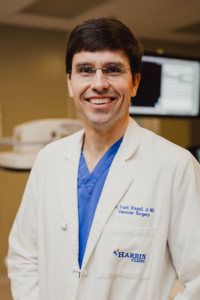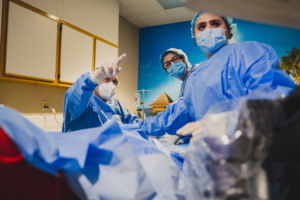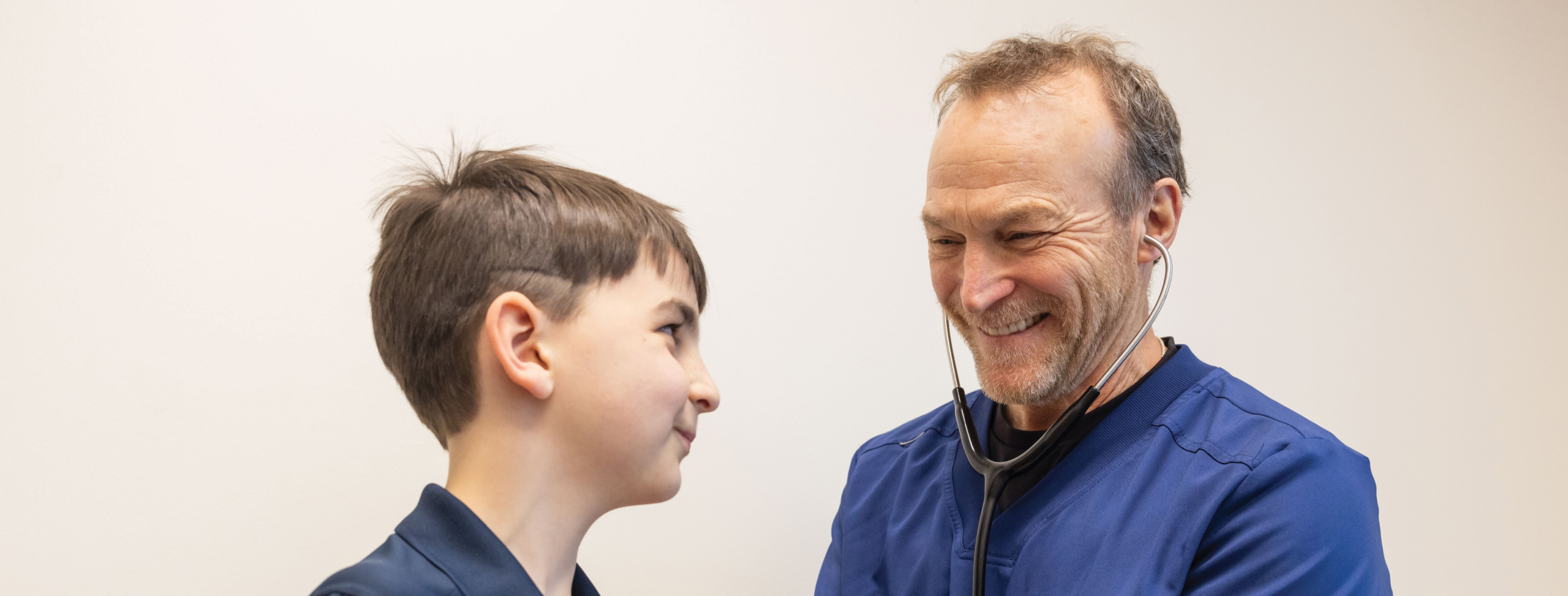Vascular Disease: In the Same Vein of Heart Health

As seen in V3 Magazine…
For American Heart Month, the physicians at Harbin Clinic want to highlight a lesser-known symptom of a serious heart-health concern — leg pain. While popular media often links chest and arm pain to a cardiac source of disease, it’s also crucial to recognize that different types of leg pain can be indicators of vascular disease. Vascular health, beyond the heart and brain, is an important part of heart-healthy living that is often overlooked. This February, get to know the vascular system and important signs of vascular disease.

WHAT IS VASCULAR HEALTH?
Simply put, vascular health is the care of blood vessels in the body. Arteries are vessels that move oxygen in blood from the heart out to tissues and organs. Veins are vessels that move blood the opposite way, transporting waste to where it needs to go in the body and ultimately returning deoxygenated blood to the heart. Even vessels in your feet are connected to the heart! There are medical specialists who are specifically trained to care for vessels beyond the brain and the heart —vascular physicians and surgeons.
VASCULAR HEALTH IN DISGUISE
The challenge with vascular health issues lies in the fact that the average person often doesn’t suspect the pain they are feeling is related to the vascular system. Imagine having a wound or a strange change to your skin that won’t go away. A common thought might be to call a dermatologist about a cut on the leg that won’t heal, but it could also be a symptom of inadequate artery circulation to the foot or that veins in the legs are having trouble returning blood to the heart (a disease known as Chronic Venous Insufficiency). This is just one example of a vascular disease that could look, from the outside, like another issue. A few other common symptoms of vascular health disease include:
- Leg pain
- Leg cramping
- Leg hair loss
- Difficulty walking
- Significant leg swelling
- Skin changes or ulcers
- Significant color change and sensations of numbness or pain in fingers and toes
Describing confusion with venous disease symptoms, Vascular Surgeon Dr. Frank Stegall explains, “Patients who have these symptoms often assume that their pain or concern is related to arthritis, skin problems, pinched nerves or even stress. Instead, they should consider vascular health concerns as a potential diagnosis. Even varicose veins, one of the most common and recognized vascular health conditions, can be brushed aside as merely a cosmetic concern, when in reality they can be extremely painful and lead to other complications if left untreated.”
Beyond these symptoms, patients who are already at a higher risk of vascular disease should consider scheduling a vascular screening. Here is a list of high-risk indicators:
- Over 50 years old
- Smoking or use of tobacco products
- History of heart disease
- Family history of high cholesterol, high blood pressure or vascular disease
- Coronary artery disease
- Diabetes
- High cholesterol
- High blood pressure
- Overweight
- Physical inactivity
Smoking is by far the greatest risk factor for the buildup of plaque in the arteries of patients. It damages the lining of vessels while also constricting them, raises blood pressure and triggers general inflammation, and increases the likelihood of blood clot formation. If you are a smoker or have previously smoked, please consider pursuing a vascular health check-up.

A HIGH-SKILLED TEAM APPROACH
There is a fantastic team of well-trained professionals at Harbin Clinic prepared to meet the needs of vascular patients. Most patients start with a visit to Harbin Clinic Vascular Medicine or Harbin Clinic Vascular Surgery, where physicians provide comprehensive services for all types of peripheral vascular disorders. While getting to know a physician and finding support for a certain diagnosis, patients often visit the Harbin Clinic Vascular Lab in the same building, which provides a broad range of non-invasive vascular diagnostic services, utilizing ultrasound imaging and physiologic testing to evaluate blood flow and locate areas of vascular disease. If a patient needs surgery, many procedures can be performed using minimally invasive practices in the vascular surgery office. However, nearly all vein treatments can also be performed at the Vein Center under local anesthetic, allowing an almost immediate return to normal activities.
Along the way, Harbin Clinic Vascular physicians and surgeons partner with other providers and specialties such as Harbin Clinic’s cardiologists, dermatologists, neurologists, rheumatologists and more. These inter-clinic partnerships allow for faster retrieval of medical information, faster appointment scheduling and ultimately faster care.
Describing this benefit Harbin Clinic Vascular Physician Dr. Chacko explains, “An added benefit of having your veins evaluated at the Vein Center at Harbin Clinic is we are a multispecialty group. At a patient’s initial comprehensive evaluation, if we discover more pressing underlying conditions- such as heart failure or kidney failure – our notes and all the tests are available via the Harbin electronic health record to primary care and specialists throughout Harbin Clinic. They have immediate access to all the information. From the very first appointment, the health care team is engaged to solve the problem.”
For those patients who are at risk or just want to learn more about their vascular health, the Harbin Clinic Vascular Diagnostic Lab offers a 30-minute vascular screening that provides critical, early detection of the three most serious, non-cardiac-related vascular diseases in the United States. One of those diseases, the abdominal aortic aneurysm, is sometimes referred to as a “silent killer” because there are no symptoms until it ruptures. Today, it is the 15th leading cause of death for Americans.
For the month of February, the Harbin Clinic Vascular Lab in Rome is offering circulatory checkups at a special price of $99. These life-saving screenings are painless, take less than 30 minutes and are strongly recommended for those who may be at risk for heart disease.
Circulatory checkups are critical in detecting the three most serious, non-cardiac related vascular diseases in the United States:
• Abdominal aortic aneurysm
• Peripheral artery disease (PAD)
• Stroke
Schedule yours today at https://harbinclinic.com/blog/vascularscreenings/ or call the Vascular Lab in Rome at 762.235.3340. If you are ready to get serious about your heart health, don’t wait until you’re on your last leg. Keep your finger on the pulse of your vascular health.


